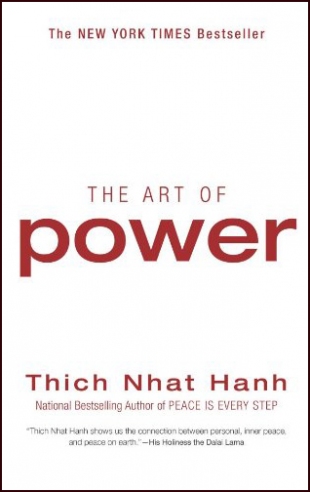We usually think of power as a force in our lives that enables us to control and dominate others. It is a vital source of energy in individuals, groups, and nations. Buddhist monk and peace activist Thich Nhat Hanh reframes the art of power and gives us a fresh and spiritual way of thinking about it and incorporating it in our lives. He states:
"Our society is founded on a very limited definition of power, namely wealth, professional success, fame, physical strength, military might, and political control. My dear friends, I suggest that there is another kind of power, a greater power: the power to be happy right in the present moment, free from addiction, fear, despair, discrimination, anger, and ignorance. This power is the birthright of every human being, whether celebrated or unknown, rich or poor, strong or weak."
Thich Nhat Hanh presents the five powers which Buddhists see as the foundation of real happiness: faith, diligence, mindfulness, concentration, and insight. They are real sources of energy and, if practiced regularly, are able to transform the quality of our lives. For example, mindfulness enables us to truly be present and not living in the past or the future. Thich Nhat Hanh gives an illustration of this from his own life:
"When I was a sixteen-year-old novice monk, my teacher taught me to open the door and close the door with one hundred percent of myself. One day, my teacher asked me to get something for him. Because I loved him very much, I was eager to do it, so I rushed to do this task and closed the door quickly.
"My teacher called me back: 'Novice, come back here.' I went back to him. I joined my palms and looked at him. He said, 'Novice, this time go out mindfully and close the door behind you mindfully.' That was the first lesson he gave me on the practice of mindfulness."
Think what a difference it would make in your life if you did more things with one hundred percent of yourself! This kind of power adds richness to our days and does not cause any suffering for others. It is quite different from the savage uses of power to frighten or hurt others.
Thich Nhat Hanh talks about the three virtues that are required if we are to be true leaders: the virtue of cutting off anger, craving and ignorance; the virtue of embracing others with loving kindness and compassion; and the virtue of insight which is the art of looking deeply. Imagine the president of the United States or the CEO of a large multinational corporation acting in accord with these virtues. The author challenges political leaders to be calm, to use loving speech, to empathize with the suffering and difficulties of others, and to talk to them with love and compassion. Such a spiritual approach would increase the happiness of all.
The Art of Power is a bold and visionary work that reframes power, ambition, success, happiness, love, and peace. We love the way Thich Nhat Hanh is able to startle us with his perception of things. Take, for example, the following: "The war on terrorism has forced us to look at each other as potential terrorists. When you travel by plane, you are searched. They are not looking for your Buddha nature; they are looking for your terrorist nature." At least now we can look upon those who search us and see their Buddha nature!
The book concludes with a section of meditations to cultivate power in everyday situations. Thich Nhat Hanh always comes back to practices, and that is why his spiritual work is so important and humanizing.
